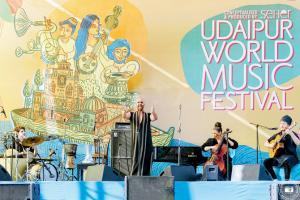Recent conversations about parenthood have given moving glimpses into the tender inheritance that passes on through blood and nurture

Gulaza, a band from Yemen, performing 'secret women songs'. Pic/Udaipur World Music Festival; Vikram Chandrasekar
 Soon after the door was opened for me and I entered our home in Mumbai and greeted my parents, my mother made an observation about how my hair looked dry. I told her it's something about the desert water, perhaps. I had spent four days in Udaipur and two nights in Jaipur.
Soon after the door was opened for me and I entered our home in Mumbai and greeted my parents, my mother made an observation about how my hair looked dry. I told her it's something about the desert water, perhaps. I had spent four days in Udaipur and two nights in Jaipur.
Because I was so busy the day I was to take the train from Delhi, I found no time to pack the shampoo that best agrees with the texture of my hair. I relied on hotel products. I was excited about showering in the bathroom at home as much as I was about eating food made by my parents, who always know how to greet my palate with my most favourite of comfort foods: prawn curry, rice and fried fish.
ADVERTISEMENT
When I was done, my mother suggested remedying the parched status of my hair. She heated up some Goan coconut oil and added a capsule of Vitamin E. I sat on the floor as she massaged it into my scalp and my tresses. I had been nursing so much menstrual fatigue, my mother's touch felt like a salve. I took an afternoon nap, sedated by her healing gesture, and woke up rejuvenated.
"Attention creates reality," I heard it said in a video installation I had encountered in a museum in Vienna by an artist I'd met in Bolzano, Karin Ferrari. At my last session in January, pleased with the progress I'd made on the subject of generosity and care-giving, my therapist decided to lure me further into my subconscious. It was finally time to tackle a recurring subject: my fear of motherhood. Why was it that I felt little doubt about my maternal instincts but no desire towards birthing? She wanted me to think more about my imagination of the vocation, and what I had internalised as the image of motherhood.
So I'm not sure if it was circumstantial or merely serendipitous, but ever since, I've found myself having innumerable, richly rewarding conversations with friends and acquaintances about the subject.
At the Udaipur World Music Festival, in the unapologetic heat of the afternoon sun, for instance, as I waited for the line-up to unfold, I found myself rapt in conversation over WhatsApp with the writing group I've been part of since I was 16 or 17. One friend, a new mother, was sharing with us her joys and frustrations, and given she's an excellent writer, everything she said was extremely articulate and tinged with wisdom. We'd been discussing how, above all, motherhood had to be a choice you make as a woman. I thought about my new love, and how, in an effort to make me feel less apprehensive about childbearing, he had told me he's "an emancipated man" who comes from a culture in which men are very invested in care-giving. Around then, a band from Yemen took centre stage.
They called themselves Gulaza. When I'd read the brief, 'Secret women songs from Yemen', I imagined women would be singing them. Instead, there was Igal Gulaza Mizrahi, who was claiming to expose the secret songs that had been passed down from mother to daughter for centuries. They were sung in Arabic, because most women in Yemen weren't allowed to study formally, and so weren't fluent in Hebrew. As Mizrahi sang, accompanied by three other musicians, his body language spoke of passion and regret, love, longing, desire. It seemed as though mouthing this generational inheritance he had intercepted empowered him as a man.
There was one moment when he held the palm of his hand near his mouth as he sang, creating a reverberation. "What nerve links the wrist to the tongue?" I found myself writing in my journal. "My mother didn't pass on songs as much as she did her sensorial recollections. Sometimes, when I cook, it's as if I'm looking for the scents that lie submerged in her memories."
Gulaza was followed by the Yves Theiler trio, and as they set up, I recognised the bass player Lucas Sisera, whom I'd met in the morning outside our hotel. Without intending to, we'd slipped into a conversation about his recent experience with fatherhood, how it left him with little time to rehearse, but more inspired than ever before. He had himself learned to play his instrument from his father, as did Yves Theiler, the pianist.
I thought of Shankar, the miniaturist I'd met in the morning, who initiated his son, Chirag, into the painterly tradition. I felt moved by the knowledge of so much tender inheritance through blood, through nurture. I circled back to the last two lines of the cryptic poem I'd read to my therapist at our last session, by Anne Sexton, titled 'Housewife'. A woman is her mother. That's the main thing.
Deliberating on the life and times of Everywoman, Rosalyn D'Mello is a reputable art critic and the author of A Handbook For My Lover. She tweets @RosaParx Send your feedback to mailbag@mid-day.com
Catch up on all the latest Mumbai news, crime news, current affairs, and also a complete guide on Mumbai from food to things to do and events across the city here. Also download the new mid-day Android and iOS apps to get latest updates
 Subscribe today by clicking the link and stay updated with the latest news!" Click here!
Subscribe today by clicking the link and stay updated with the latest news!" Click here!







